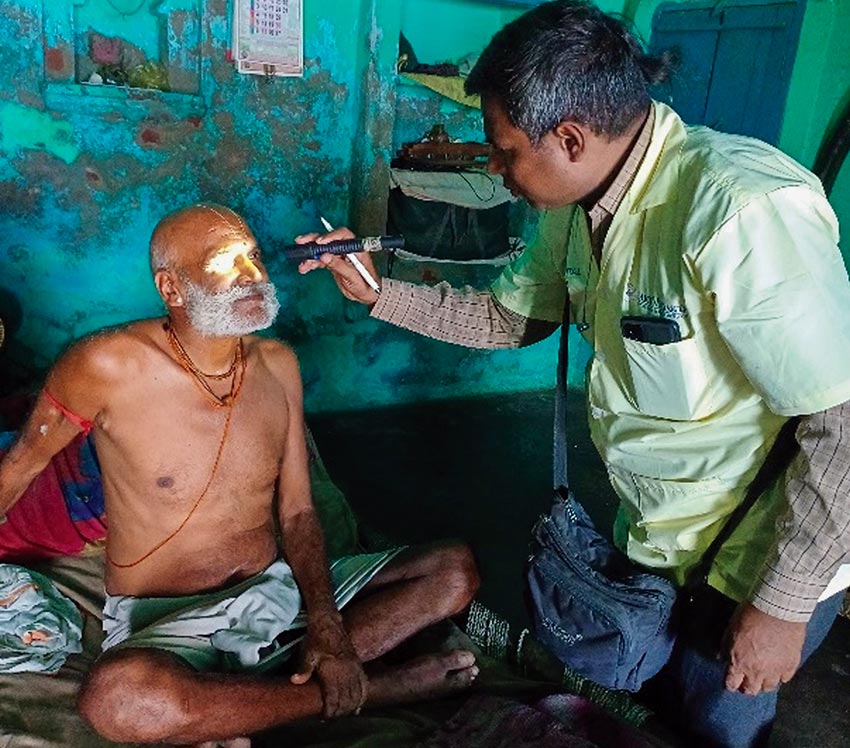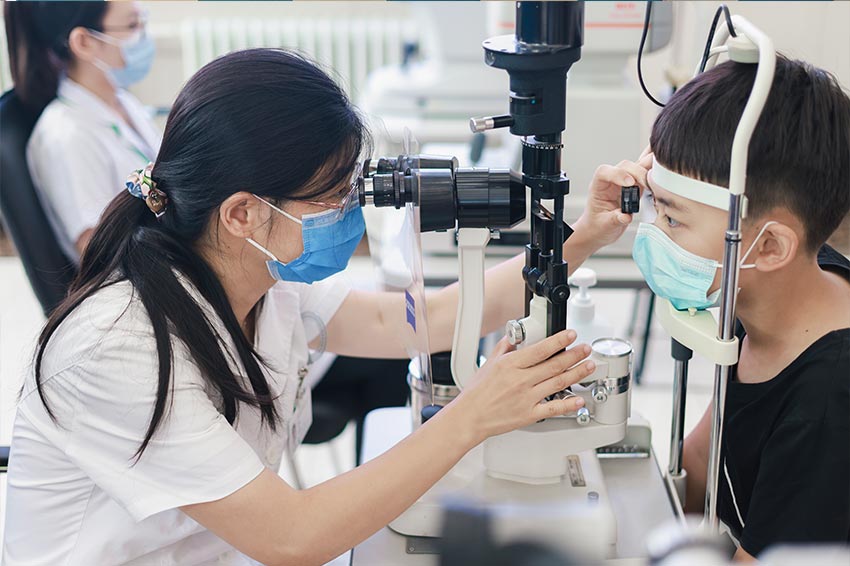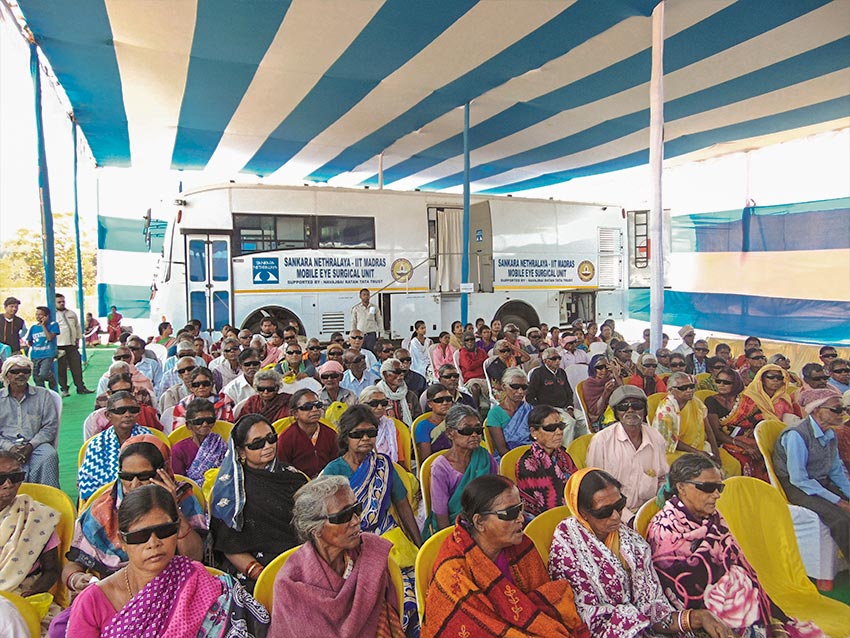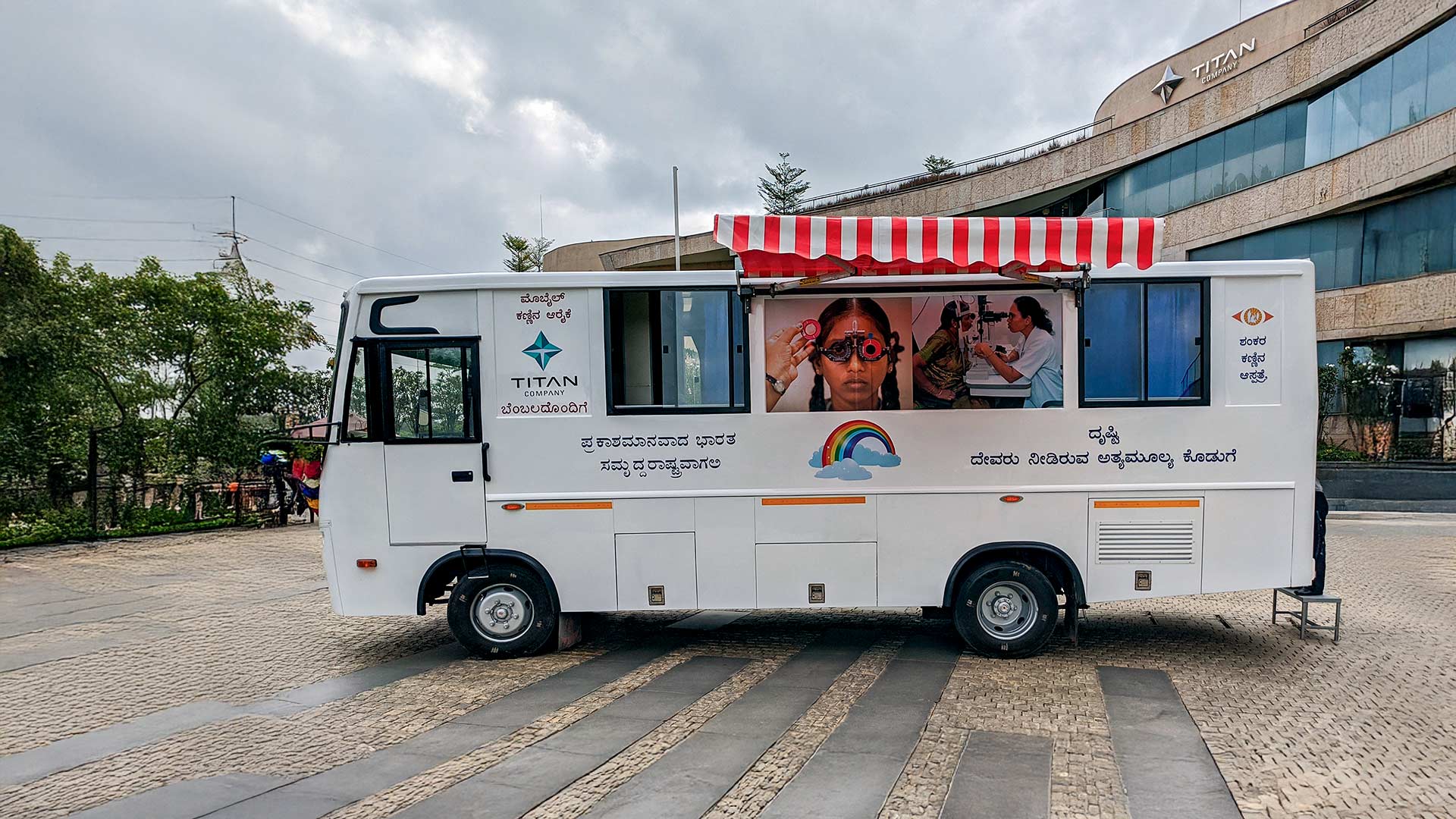March 2025 | 1776 words | 7-minute read
For Brinda Devi, a 57-year-old homemaker from Balua village in Bihar, tending to her home and nurturing her family were some of life’s most joyous moments. However, a dark cloud threatened to shroud this bliss when increasingly cloudy vision robbed her of her independence.
A beacon of light pierced this labyrinth of gloom when she visited a free eye screening camp organised by a super speciality eye hospital, in partnership with Tata Capital. She was diagnosed with bilateral cataracts and offered surgery free of cost to correct her vision. As her bandages were removed, the world in its myriad and brilliant hues greeted Ms Devi, restoring in one stroke her innate sense of purpose. Celebrating this return to self-reliance, she began cultivating a small vegetable garden to supplement her family’s income.
Like Ms Devi, several people have found new hope through Aarogyatara, Tata Capital’s healthcare initiative that aims to eradicate curable blindness. It provides inclusive primary eye care for underserved and rural communities in Maharashtra, Bihar, Uttar Pradesh, Karnataka and Tamil Nadu.

Mission critical
In 2020, the International Agency for the Prevention of Blindness (IAPB) reported that India had the most vision impaired people — 27 crore — and the fifth highest overall rate of impairment. In 2024, IAPB estimated ~35 lakh children and adolescents in India have vision issues, posing an enormous financial burden — just one year of suboptimal learning among students results in a Rs 15,600 crore loss in productivity every year. IAPB added that if a five-year-old child with poor vision receives glasses in primary school and wears them till they are 18, they will have a 55% increase in lifetime earnings.
Started in 2018, Aarogyatara conducts screening camps for adults and children to help diagnose refractive errors and eye disorders and provides timely treatment in the form of spectacles or surgeries (even for infants), organised in partnership with leading eye hospitals. Incentives such as free transportation, hospital accommodation and meals, and post-surgical care are also offered. In 2023, Aarogyatara also conducted free eye screening camps for thousands of Mumbai’s traffic police personnel to raise awareness of vision loss due to diabetes.
“Access to healthcare services is a basic human right, and we are proud to be able to help underprivileged individuals experience the joy of sight and the thrill of seeing the world clearly,” says Sridhar Sarathy, Chief Ethics Officer and Head - Sustainability and Corporate Social Responsibility, Tata Capital. “We plan to expand this initiative to touch five million lives over the next two years.”
Where hope springs
When 12-year-old Muneeshwaran, from Chinna Thadagam village in Tamil Nadu, struggled to read the blackboard at his local government school, his worried parents took him to Sankara Vision Centre in Anaikatti. There, he was diagnosed with bilateral cataracts and received surgery free of cost at Sankara Eye Hospital in Coimbatore as part of Titan Company’s Happy Eyes programme. His vision restored, he won a prize at a state-level drawing competition, which he dedicated to Sankara Eye Hospital and Happy Eyes.
“Launched in 2013, this comprehensive eye care programme is part of our endeavour to make accessible and affordable healthcare a reality,” says NE Sridhar, Head of Corporate Sustainability, Titan Company. “It addresses the needs of underprivileged adults and school children in the rural hinterland of Tamil Nadu and Karnataka, and seeks to eliminate preventable blindness.”
Gift of Vision, the first intervention under Happy Eyes, is a rural outreach eye care programme for the elderly that capitalises on pre-existing community networks to identify those with vision impairments and provide them free surgical treatment, transportation, boarding, medicines and post-operative evaluations. In 2014, Happy Eyes went a step further and introduced its second intervention, Nanna Kannu, a paediatric eye care programme for government school students in Karnataka. It conducts eye examinations to ensure no child is struck with preventable blindness and also provides eye screening kits and trains teachers and volunteers from Titan on how to identify eye health issues in students.
Making Indian roads safe
According to the Bridging Vision Gaps April 2024 report, one in three truck drivers in India has compromised vision, leaving them prone to accidents. To make vision care accessible to this community that is constantly on the move, Titan Eye+ began offering eye tests to drivers in June 2024 and later introduced the Eye Test Menu on World Sight Day. Transforming a routine stopover for a meal into an engaging opportunity for eye care, Titan Eye+ set up eye test camps at roadside dhabas frequented by truck drivers. To place an order, drivers have to interact with the Eye Test Menu, a food menu designed to mimic an eye test chart — colours, fonts and spacing are used by optometrists to test the driver’s vision. Those with vision issues are prescribed spectacles, which are shipped to their homes at subsidised prices.
“The Eye Test Menu is an innovation we are particularly proud of because it doesn’t just offer eye tests — it reaches people where they are and in a manner that catches their attention, shaking the apathy out of vision care,” said Maneesh Krishnamurthy, Marketing Head, Eyecare Division, Titan Company. Since June 2024, Titan Eye+ has screened 7,000+ drivers in 900+ locations across India. Building on the success of its Eye Test Menu, Titan will be partnering with organisations to achieve the ambitious goal of conducting eye tests for over 1 lakh drivers, promoting better vision and road safety.
Another Happy Eyes initiative is the Mobile Rural Vision Project, which extends specialised eye care services to remote areas in and around Bengaluru using a fully equipped mobile unit. During the pandemic, Titan established permanent tele-ophthalmology centres called Vision Centres in villages in Tamil Nadu and Karnataka to act as a vital link between rural communities and base hospitals (Sankara Eye Hospitals), ensuring early detection, referral and appropriate treatment. Cataract Backlog and Blindness Free Block is the latest Happy Eyes initiative, which operates at the district level to ensure comprehensive coverage. Villagers in Annur, Aruppukottai, Mettupalayam and Rajapalayam, who were unable to avail of treatment or eye check-ups during the pandemic, are screened and provided with free surgeries to cure refractive errors.

Heal the world
In 2014, JLR China and the China Soong Ching Ling Foundation established the first CSR fund in the Chinese auto industry exclusively dedicated to helping children and youth, particularly in underprivileged areas. Called the China Children and Youth Dream Fund (Dream Fund), its flagship initiative Journey for Vision provides free eye examinations and surgical treatment for underprivileged children. “JLR China offers young generations support beyond the material — through the Journey for Vision initiative, we empower young people to not only have healthy and happy lives, but also to dream big and fearlessly pursue their true ambitions,” says Anthea Wang, Executive Vice President of Corporate Affairs and Public Relations, JLR China.
The programme covers one underserved province or autonomous region every year and addresses the needs of children and youth, especially those whose parents have migrated to cities. For Medine, a Uyghur girl from Xinjiang, who had lost her vision due to an untreated bacterial infection, finding two cornea donors through the Dream Fund provided a beacon of hope. Volunteers recall the wonder in her eyes as the bandages were removed and the levity with which she remarked how handsome her dad looked.
Additionally, the Journey for Vision programme provides ophthalmology training for local doctors in partnership with Beijing Tongren Hospital, which specialises in ophthalmology and
otolaryngology, and donates eye care kits and ophthalmic medical equipment. Also on call are a fleet of Defender car owners, JLR employees and volunteers to transport children from remote areas to major cities for treatment and to help doctors transfer equipment.
A beam of light
Another tale of hope is unfolding in Jharkhand and Odisha where Tata Steel Foundation (TSF) provides accessible eye care, through Project Drishti, to prevent vision loss in tribal and rural communities. Launched in April 2024, it works in collaboration with various stakeholders including local communities, District Blindness Control Society, District Education Department, civil society organisations, healthcare providers, frontline health workers and schoolteachers, and tailors its interventions to the unique needs and challenges of specific areas.

“Preventable blindness remains one of the major deliverables of TSF. Its earlier programme on door-step cataract surgeries has now evolved into Project Drishti, a comprehensive programme involving corrective surgeries for cataract, retinopathy of prematurity and school eye health. Aiming to reach every newborn, school-going child, and person with cataract across 12 blocks of Jharkhand and Odisha, providing the gift of sight to the needy in the most remote geographies remains the guiding force for TSF,” says Dr Anuj Bhatnagar, Head - Public Health, Tata Steel Foundation.
Project Drishti focuses on four main areas, providing specialised eye care from infancy to old age. These include preventing vision problems in premature babies by training frontline health workers, identifying and correcting vision issues in school-going children through screening programmes, restoring sight for the elderly through cataract surgeries using a block saturation model, and raising awareness on the importance of eye health and regular eye check-ups.
For Kartik Chandra Roul of Latachudi in Odisha, Project Drishti has been a godsend. “I used to have difficulty driving a bike at night but now I can see well and don’t have any problems,” says Mr Roul. “I underwent an eye operation, and a post-op check-up; neither cost me anything. I even convinced two to four people in my village to get treated, and their eyes are also healthy now.”
Eye care programmes such as these are slowly but surely restoring the gift of vision, eliminating preventable blindness and offering a ray of hope by making primary eye care facilities accessible for countless people.
—Sharmistha Choudhury


































